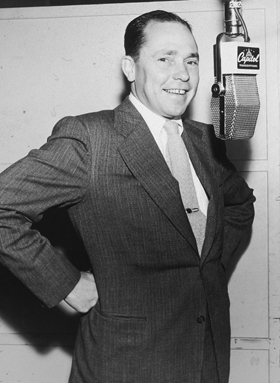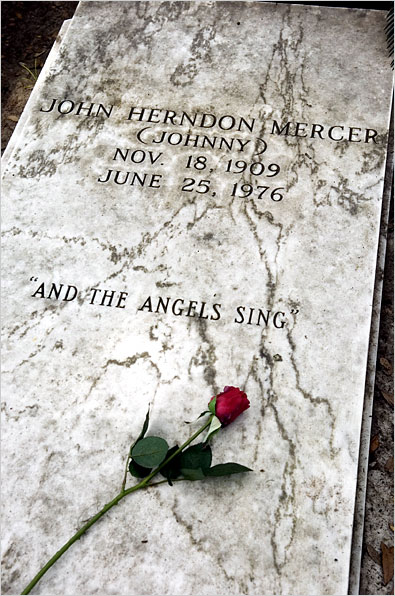 Mrs. T and I recently got around to watching Turner Classic Movies’ Johnny Mercer: The Dream’s on Me, a Clint Eastwood-produced two-hour documentary full of priceless archival footage. It’s being telecast in honor of the upcoming centennial of the birth of the author of the lyrics (and, on occasion, the music) to such classic songs as “Ac-cent-tchu-ate the Positive,” “Autumn Leaves,” “Blues in the Night,” “Come Rain or Come Shine,” “Days of Wine and Roses,” “Early Autumn,” “Emily,” “Jeepers Creepers,” “I Remember You,” “I Thought About You,” “I Wonder What Became of Me,” “I’m an Old Cowhand,” “I’m Old Fashioned,” “Laura,” “Moon River,” “One for My Baby,” “Something’s Gotta Give,” “Skylark,” and “That Old Black Magic.”
Mrs. T and I recently got around to watching Turner Classic Movies’ Johnny Mercer: The Dream’s on Me, a Clint Eastwood-produced two-hour documentary full of priceless archival footage. It’s being telecast in honor of the upcoming centennial of the birth of the author of the lyrics (and, on occasion, the music) to such classic songs as “Ac-cent-tchu-ate the Positive,” “Autumn Leaves,” “Blues in the Night,” “Come Rain or Come Shine,” “Days of Wine and Roses,” “Early Autumn,” “Emily,” “Jeepers Creepers,” “I Remember You,” “I Thought About You,” “I Wonder What Became of Me,” “I’m an Old Cowhand,” “I’m Old Fashioned,” “Laura,” “Moon River,” “One for My Baby,” “Something’s Gotta Give,” “Skylark,” and “That Old Black Magic.”
Though Mercer is my favorite lyricist, I didn’t write anything about The Dream’s on Me because I’d already said what I had to say about him in “Too Marvelous for Words,” an essay that I published in Commentary in 1994. Here is part of that piece, which has never been collected or reprinted since its original appearance.
* * *
Mercer’s brand of lyricism–unabashed yet unsentimental, and expressed with a colloquial directness that conceals extreme technical sophistication–is unmistakable. No one else, for example, could have written a lyric like “Skylark” (1942): Skylark,/Have you anything to say to me?/Won’t you tell me where my love can be?/Is there a meadow in the mist/Where someone’s waiting to be kissed? In its precise rhymes and beautifully shaped cadences, it is obviously a product of the golden age of American songwriting. But no other golden-age lyricist, not even Oscar Hammerstein II, could have aspired to its air of uncontrived simplicity….
 Mercer was one of the few major American songwriters who were not big-city Easterners–he came from Savannah, Georgia–and to some extent his style reflects this difference of cultural background. At the same time, though, he was more than a homespun versifier who just happened to write popular songs. His creative impulse, unlike that of Ira Gershwin or Cole Porter, was essentially lyrical, and this quality intensified as he grew older–so much so that in such later songs as “Days of Wine and Roses” (1962), the melody, memorable though it may be, is not needed in order to heighten the poetic quality of the words: The days of wine and roses/Laugh and run away,/Like a child at play,/Through the meadowland toward a closing door,/A door marked “Nevermore,”/That wasn’t there before….
Mercer was one of the few major American songwriters who were not big-city Easterners–he came from Savannah, Georgia–and to some extent his style reflects this difference of cultural background. At the same time, though, he was more than a homespun versifier who just happened to write popular songs. His creative impulse, unlike that of Ira Gershwin or Cole Porter, was essentially lyrical, and this quality intensified as he grew older–so much so that in such later songs as “Days of Wine and Roses” (1962), the melody, memorable though it may be, is not needed in order to heighten the poetic quality of the words: The days of wine and roses/Laugh and run away,/Like a child at play,/Through the meadowland toward a closing door,/A door marked “Nevermore,”/That wasn’t there before….
Gene Lees paradoxically asserts that Mercer “was more than a poet, he was a lyricist.” Like all paradoxes, this one sheds light without offering a definitive answer to the question it implies. My own published view, if less suggestive, has the virtue of being more clear-cut:
For all the utilitarian considerations that brought [his songs] into being, their aesthetic appeal is considerable, and the more I reflect on Mercer’s achievement, the more I am inclined to think that he deserves to be considered not merely as a writer of supremely well-crafted song lyrics, but as one of the most gifted poets this country has produced.
Continued immersion in and reflection on Mercer’s work has done nothing to change my opinion–though I would hasten to add that even his most frankly poetic lyrics are best heard in tandem with the melodies that inspired them. Hence they occupy the same equivocal position as, say, Bernard Herrmann’s film scores, which are the products of a collaborative process and cannot be properly evaluated outside the context of that process. It is revealing that Mercer published no poetry, presumably because he felt he had no gift for writing it. Only in the crucible of collaboration did his talents manifest themselves completely.
Does this diminish the significance of his achievement? Must he necessarily be considered a lesser artist than a writer who works exclusively on his own? To make such a claim, after all, is by extension to relegate all forms of collaborative art to a lower level of excellence simply because of the process by which they came into being. Is Citizen Kane an inferior work because Orson Welles created it in collaboration with Herrmann, the screenwriter Herman J. Mankiewicz, and the cinematographer Gregg Toland? Conversely, is Irving Berlin’s “How Deep Is the Ocean?” a better song than “Days of Wine and Roses” simply by virtue of the fact that Berlin wrote both words and music?
For me, the answer to all these questions is an unequivocal no–but whether or not that makes Johnny Mercer a true poet is another matter, and one about which he himself had nothing to say. Perhaps, though, one might look to one of his own lyrics, “One for My Baby,” for an answer:
You’d never know it,
But buddy, I’m a kind of poet,
And I’ve gotta lotta things to say.
And when I’m gloomy,
You simply gotta listen to me,
Until it’s talked away.
Who can doubt that the man who wrote these lines was at the very least “a kind of poet”? Or that the world will continue to listen to the things he had to say long after most of the full-fledged “poets” of our own day are dead and forgotten?
* * *
The Complete Lyrics of Johnny Mercer, a handsome coffee-table book that reprints all of Mercer’s lyrics, has just been published by Knopf.
Mosaic Select: Johnny Mercer, a three-CD box set, contains seventy-nine of the recordings that Mercer made as a singer between 1942 and 1947 for Capitol Records, the label that he co-founded.
Mercer also makes a cameo appearance on the version of “Lazy River” recorded by Bing Crosby and Louis Armstrong in 1960 for their only duet album, Bing & Satchmo. (You can download “Lazy River” individually from Amazon or iTunes.)
My favorite album of Mercer’s songs is Nancy LaMott’s Come Rain or Come Shine: The Songs of Johnny Mercer.
